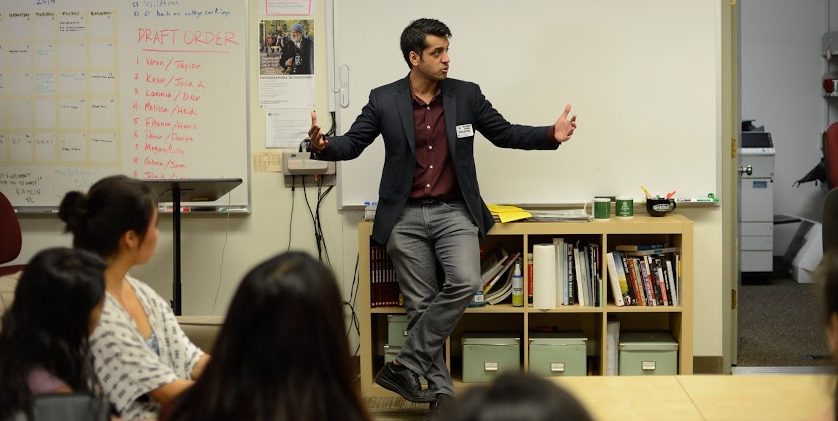Wajahat Ali speaks on being authentic activist
September 19, 2015
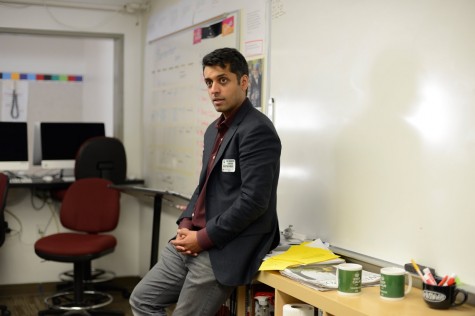
Wajahat Ali speaks to students during a post-assembly Q&A in the journalism room. Ali shared anecdotes about growing up Muslim American, and how that experience changed for him post 9/11.
The celebrated playwright, Muslim activist, lawyer, Al-Jazeera America anchor and middle school alumnus Wajahat Ali (‘94) would describe himself as a mushroom.
“It belongs to the fungus kingdom, and it doesn’t get a lot of respect,” he said to a group of about 30 upper school journalists, Modern International Affairs students and other spectators during a Q&A session. “But it grows everywhere, and it’s useful because it helps decompose stuff and you can also eat it. It’s everywhere and nowhere at the same time.”
Standing at the front of the journalism room dressed in a burgundy dress shirt, blazer and jeans, Ali re-introduces himself as Wajahat Ali, a mushroom, and continues to maintain a deceptively casual demeanor as he fields questions on topics such as growing up Muslim-American and experiencing bigotry firsthand after the September 11 attacks.
These topics are seldom met with earnest amusement, but Ali’s storytelling has the room echoing with laughter.
“We’re living in absurd times right now, and I see humor as a great diffuser,” he said. “Humor for me has always been helpful in life, in the ways that I process both tragedy and failure, and the absurdity of the human condition and the absurdity of 2015 America. It allows me to have catharsis and understanding.”
Introduced by Shay Lari-Hosain (12) yesterday, he spoke to upper school students and faculty at large during a morning assembly, discussing the humors and hardships — even humorous hardships, at times — of growing up in the Bay Area as a Muslim American youth, and how that experience changed for him post-9/11. Ali’s persona onstage and during the Q&A afterward remained calm, purposeful and charming.
“If you hate me on stage, you’ll hate me in person,” he said. “I try to be very consistent.”
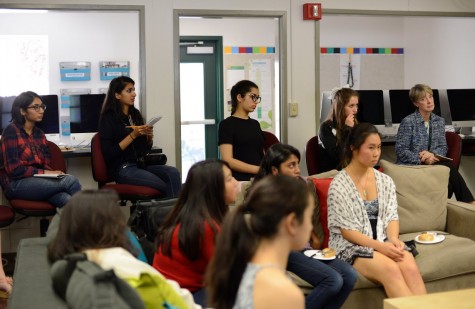
A group of upper school journalism and modern international affairs students were excused from class to attend the Q&A, which took place during third period.
Born to Pakistani immigrant parents, Ali reminisced on his childhood and time at Harker from 1986 to 1994, joking about having lentil stains on his shirt and only speaking Urdu until the age of five.
“I was born and raised in ‘Fremont-istan,’ California,” he quipped.
He referred to himself as being a “multi-hyphenated minority kid,” and how in being so, he often was the “token” Pakistani or Muslim in many situations growing up.
During his time in high school at Bellarmine College Preparatory, Ali was a member of Sanguine Humours, a comedy improv troupe. He later studied English at UC Berkeley for his undergraduate education, discovering his passion for storytelling. According to Ali, this aspiration defied the norm in his South Asian community (where the only three acceptable vocations are a doctor, an engineer or a wealthy yet dubious businessman), but after 9/11 he saw that the need for Muslim-American storytellers had skyrocketed.
“In 2001, we had white non-Muslim talking heads on TV speaking about Muslims and Islam,” he said. “To see a Muslim was like a unicorn. But it was also a failure of American Muslim communities, because 90 percent of Muslims after 9/11 were one of four occupations: doctor, engineer, import-export [businessman] and taxi-driver. That left 10 percent for law, politicians, journalists, diplomats and so forth. My generation, the 9/11 generation, was like a baptism by fire, so a lot of us abandoned that checklist.”
During 2001, Ali was a senior at UC Berkeley and the head of Berkeley’s Muslim Student Association during and immediately after the 9/11 attack. In that time, he became a “professional Muslim,” espousing the role of student leader and activist.
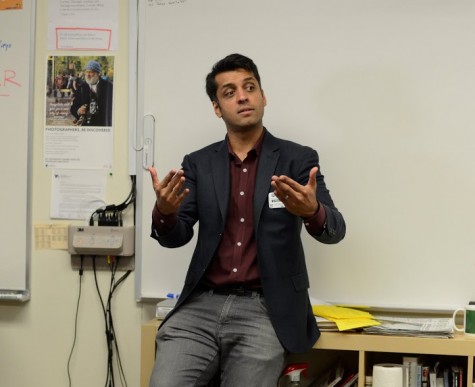
Wajahat Ali speaks of becoming a “professional Muslim” after 9/11. At the time, Ali was an undergraduate in his senior year at UC Berkeley.
“As a ‘professional Muslim,’ you have to be a walking wikipedia article or instant expert on Islam, Qu’ran, Shari’a, Hamas, hummus, Fatah, fatwas, Iran [and] Salman Khan,” he joked.
Taking on a more serious tone, he described the position that he, as the head of the Muslim Students Association, and his fellow students were now in and would continue to be in throughout the many years ahead.
“Your personal [mess-up] will be used to ignite rage against 1.2 billion people in the world,” he said. “You will perpetually be seen as a suspect, pre-convicted by an invisible judge [and] jury that holds your patriotism in suspect.”
At the time, Ali was also in a short story class with Professor Ishmael Reed, who encouraged him to write a play. Thus, Ali’s acclaimed production “The Domestic Crusaders” was born, detailing the life of a Pakistani American family after 9/11. Ultimately staged off-broadway at Nuyorican Poets Café in New York, “The Domestic Crusaders” premiered at the Berkeley Repertory Theatre in Berkeley, California, in July of 2005.
Ali stressed that the need for Muslim Americans to take on their agency and share their own narratives has only increased in the years since 9/11.
“Don’t sell yourself — share your story,” he said. “Sometimes, you need to defend yourself, so I’m not that person that says to always be passive. You have a voice, use your voice, defend yourself if you have to, but you can also defend yourself by speaking up and telling your story.”
Ali emphasized the significance of sharing stories in empowering others and shifting their mindsets.
“It’s very easy to feel righteous dejection or futility,” Ali said. “I don’t believe in kumbayas, I’m not we are the world, I try to keep it honest, I’m 34 years old and I realize it’s impossible to change people’s minds. If I can just shift someone’s [mindset] one degree, that’s huge.”
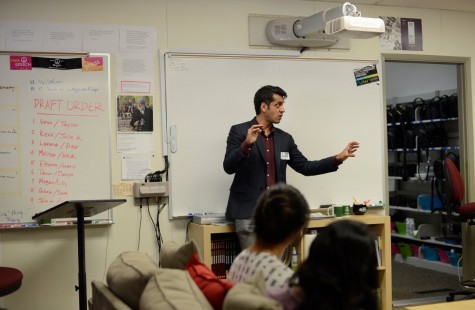
Wajahat Ali responds to a question posed by a student. The Q&A lasted approximately 30 minutes.
Ali has maintained the philosophy of the importance in storytelling in many areas of his life, having been published widely in newspapers such as the New York Times, the Guardian, the Huffington Post and many other publications. He encouraged students to live as active participants in the world, rather than as spectators.
“If you sit on the shore and don’t go in the water to catch the wave, you will never catch the wave,” he said. “If you go in the water — and eight times out of 10, you wipe out — at least you tried. Boos come from the cheap seats. Everyone’s a spectator, and very few people decide to be participants. Once you’re in the ring, you’re going to get hated on. You actually know you’re succeeding when you get more haters, it’s weird.”
When asked about his own approach when accosted by “haters,” Ali had a unique response, advising students against acting in the manner of cartoon character Daffy Duck.
“Be like Bugs Bunny,” he said. “I always act like Bugs Bunny. Bugs is always cool, calm, and collected. Bugs is always two steps ahead of Elmer Fudd.”
Later, during a discussion with the upper school Diversity Committee, he spoke of the difficulties of getting stories about minority lives out into the mainstream in an industry so determined to keep “ethnic” stories out of the mainstream.
Ali denounced that distinction. “The ethnic is the mainstream,” he declared.
Much like the “mushroom” that Ali compared himself to, the stories seem to be “everywhere and nowhere” at the same time — common experiences of people of color or other types of minorities that altogether seem missing from mainstream media.
Ali continued to highlight the far-reaching importance of storytelling among minorities, especially youth, and plans to continue telling his own stories with a possible book project ahead.
